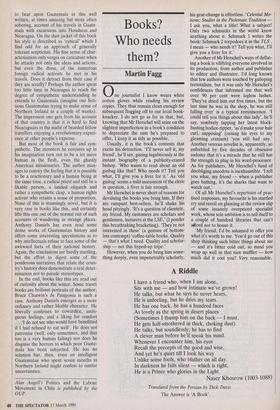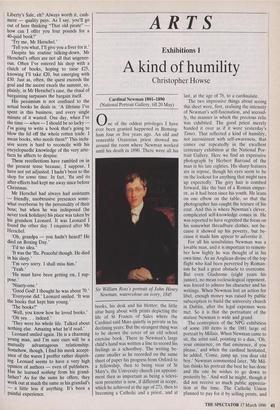Books?
Who needs them?
Martin Fagg
One journalist I know wears white cotton gloves while reading his review copies. They thus remain clean enough for subsequent flogging off to our local book- knacker. I do not go as far as that, but, knowing that Mr Herschel will seize on the slightest imperfection in a book's condition to depreciate the sum he's prepared to offer, I keep it as tidy as possible.
Usually, it is the book's contents that excite his detraction. I'll never sell it, my friend', he'll say, gazing lugubriously at the instant biography of a publicity-crazed bishop. 'Who wants to read about an old gasbag like that? Who needs it? Tell you what, I'll give you a fiver for it.' As 'old gasbag' seems a mild assessment of the cleric in question, a fiver is fair enough.
Mr Herschel is never short of reasons for devaluing the books you bring him. If they are rampant best-sellers, he'll shake his head pityingly. 'It's a question of clientele, my friend. My customers are scholars and gentlemen, lecturers at the LSE,' (I ponder this breathtaking bracketing). 'They're not interested in these' (a gesture of bottom- less contempt) 'coffee-table books. Quality — that's what I need. Quality and scholar- ship — not this hyped-up tripe.'
However, when you do bring him some- thing deeply, even impenetrably scholarly, his gear-change is effortless. 'Celestial Mo- tions: Studies in the Ptolemaic Tradition — I ask you, what a title! What a subject! Only two schmucks in the world know anything about it. Schmuck 1 writes the book: Schmuck 2 torpedoes it in the TLS . I mean — who needs it? Tell you what, I'll give you a fiver for it.'
Another of Mr Herschel's ways of deflat- ing a book is vilifying everyone involved in its production, from author and publisher to editor and illustrator. I'd long known that few authors were touched by galloping teetotalism, but it was only Mr Herschel's confidences that informed me that well over 90 per cent were legless lushes. `They've dried him out five times, but the last time he was in the shop, he was still falling over' is a typical reminiscence. could tell you things about this lady', he'll say, sombrely tapping her latest block- busting bodice-ripper, `as'd make your hair curl, supposing' (raising his eyes to my gleaming cranium) 'you still had any.' Another veteran novelist is, apparently, so enfeebled by five decades of obsessive sodomy that it's a miracle that he still has the strength to plug in his word-processor. As for publishers, Mr Herschel's fund of disobliging anecdote is inexhaustible. 'I tell you what, my friend — when a publisher goes bathing, it's the sharks that want to watch out.'
Of all Mr Herschel's repertoire of prac- tised responses, my favourite is his startled cry and recoil on glancing at the review slip of some insanely overpriced specialist work, whose sole ambition is to sell itself to a couple of hundred libraries that can't Word not to house it.
`My friend, I'd be ashamed to offer you what it's worth to me. You'd go out of this shop thinking such bitter things about me — and it's bitter cold out, so mind you wrap up well in that nice muffler — how much did it cost you? Very reasonable. Liberty's Sale, eh? Always worth it, cash- mere — quality pays. As I say, you'll go out of here thinking "That old pirate" how can I offer you four pounds for a 40-quid book?'
`Try me, Mr Herschel.'
`Tell you what, I'll give you a fiver for it.'
Despite his routine talking-down, Mr Herschel's offers are not all that ungener- ous. Often I've entered his shop with a clutch of books, hoping to raise £25, knowing I'll take £20, but emerging with £30. Just as, often, the quest exceeds the goal and the ascent excels the summit, so, plainly, in Mr Herschel's case, the ritual of bargaining surpasses the bargain itself.
His pessimism is not confined to the actual books he deals in. 'A lifetime I've spent in this business, and every single minute of it wasted. One day, when I've the time — when — I should be so lucky I'm going to write a book that's going to blow the lid off the whole rotten trade. I mean books, who needs them?' This inclu- sive scorn is hard to reconcile with his encyclopaedic knowledge of the very arte- facts he affects to despise.
These recollections have rambled on in the present tense because, I suppose, I have not yet adjusted. I hadn't been to the shop for some time. In fact, 'flu and its after-effects had kept me away since before Christmas.
Mr Herschel had always had assistants — friendly, unobtrusive presences some- what overborne by the personality of their boss; but when he was indisposed (he never took holidays) his place was taken by his grandson Leonard. It was Leonard I found the other day. I enquired after Mr Herschel.
`Oh, grandpa — you hadn't heard? He died on Boxing Day.'
`I'd no idea.'
`It was the 'flu. Peaceful though. He died in his sleep.'
`I'm very sorry. I shall miss him.' `Yeah.'
`He must have been getting on, I sup- pose.'
Ninety-one.'
`Good God! I thought he was about 70.' `Everyone did.' Leonard smiled. 'It was the books that kept him young.'
`The books?'
`Well, you know how he loved books.' `Oh yes. . . indeed.'
"They were his whole life. Talked about nothing else. Amazing what he'd read.'
Leonard smiled again. He is a charming Young man, and I'm sure ours will be a mutually advantageous relationship. Somehow, though, I find his meek accept- ance of the wares I proffer rather dispirit- ing. Leonard seems to have a very high opinion of authors — even of publishers, Has he learned nothing from his grand- father? As for the sums he offers, they work out at much the same as his grandad's — a little less if anything. It's been a painful experience.



























































 Previous page
Previous page